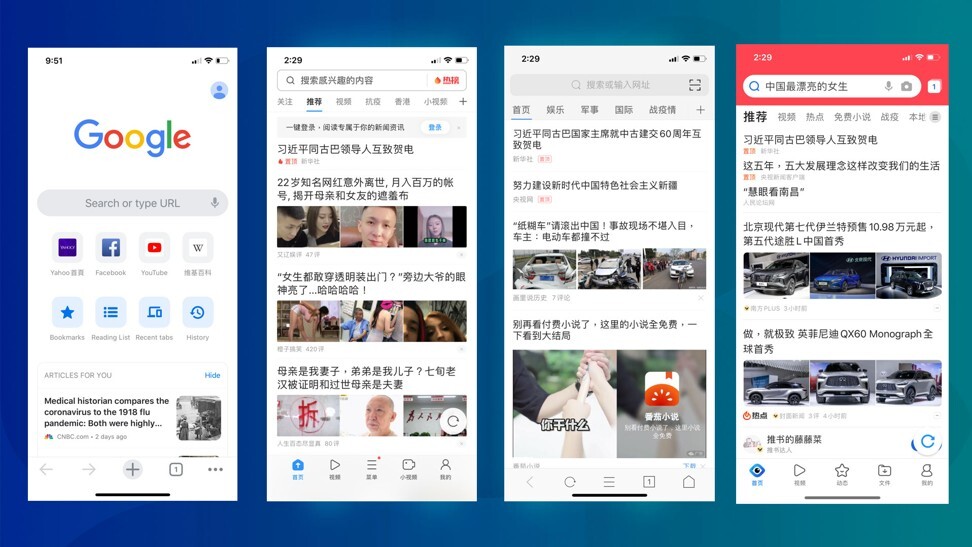- Internet users in China cannot use the Google search engine without a VPN, yet Chrome has the highest market share among web browsers
- China has no shortage of domestic browsers to choose from, including UC Browser, 360 Browser and QQ Browser
Russel Zeng lives in the southern Chinese city of Shenzhen. But Google Chrome is his window to the world.
From his office in the city often called the Silicon Valley of China, the tech worker reads English news sites in Google's web browser on his computer. With FireShot, one of the myriad free browser extensions available on Chrome, he takes screenshots of articles that he finds useful and shares them with his colleagues. To improve his English writing, he uses the Grammarly extension to check for spelling mistakes and get word suggestions.
"I don't remember exactly why I switched to Chrome a few years ago," he said. "I think I was having difficulties installing extensions on Safari and QQ Browser, and Chrome was the name that got mentioned the most by the friends I asked to recommend a new browser."
Get the latest insights and analysis from our Global Impact newsletter on the big stories originating in China.
Zeng is not alone.
Google Chrome is the most commonly used browser in mainland China, according to various data sources.
Across both desktops and smartphones, Chrome has 36 to 39 per cent of the browser market this year, Baidu analytics shows. In one month, it beat its closest rivals - Microsoft's Internet Explorer and Tencent Holdings' QQ Browser - by more than 28 percentage points.
The most recent data from CNCERT, China's national computer emergency response body, shows a similar story. The report shows Chrome with 30 per cent of China's mobile browser market in the third quarter of 2019.

Chrome still is not as popular in China as the rest of the world. The browser has about two-thirds of global market share, according to StatCounter. But in mainland China, where most of Google's services are unavailable, Chrome's traction stands out as an anomaly.
Google's search engine has been blocked on the mainland since 2010, when Google stopped censoring search results following a series of China-originated cyberattacks. Since then, nearly all of Google's services have been blocked in the country, including the Google Play app store. While plenty of Google apps can be found on Apple's iOS and various Android app stores in China, most will not work without a virtual private network (VPN).
But Chrome does not require a connection to Google's servers to work. In China, it can be directly downloaded at www.google.cn/chrome. The app allows you to switch the default search engine from Google to ones like Baidu and Bing, which are accessible in China.
"In China, people choose Google Chrome basically because it's faster and more user-friendly," said Yuwan Hu, an analyst at the Shanghai-based market research firm Daxue Consulting. "The speed is the main reason."
In some app stores, Chrome exists alongside plenty of rivals. Microsoft's and Mozilla's browsers are easily available. And domestic giants like Tencent, Sogou Alibaba Group Holding, which owns the South China Morning Post, all have their own browsers. Domestic phone brands Xiaomi and Oppo also have their own browsers that they ship preinstalled on their devices.
When faced with the choice of which browser to install, many users pick Chrome. And users have plenty of reasons for it.
"Google Chrome is just simpler," wrote one user on Zhihu, a Quora-like Chinese site. "It lets you focus on the web pages themselves and forget about the browser."
Another user wrote, "The reason I don't like most Chinese browsers is that they are too profit-driven. Essentially, they are not browsers but rather tools for companies to advertise, promote and hunt users (I think hunt is the more appropriate word)."

When you open Google Chrome for the first time, you will find a nearly blank page save a few things: a combined search and URL bar, several shortcuts to commonly visited websites, and sometimes a recommended article.
A typical Chinese browser looks quite different.
The search and URL bar is at the top. Right underneath is a featured article from a state-run media outlet, trailed by an endless feed of other online articles from various sources. Other tabs lead to more articles to read and videos to watch.
A layout like this blurs the line between a browser and a news app. Jinri Toutiao, the breakout Chinese app from TikTok owner ByteDance, made its name as a news aggregator following a similar design. In addition to offering news articles, the app also works as a browser and search engine, allowing you to type search terms and web addresses in the search bar.
Such designs have been a formula of success for start-ups like ByteDance, whose speciality is keeping people glued to the screen with personalised streams of information. But whether that is the ideal way to build a browser is another question. And a sizeable number of Chinese users seem to prefer their browsers less cluttered and more utilitarian, like Chrome.
"Chrome is way ahead of other browsers. It is visibly faster, the interface is simpler, and it has no pop-ups," said Zeng, the Shenzhen worker. On some Chinese browsers, advertisements sometimes pop up after you leave the app idle.

Kaiser Kuo, former international communications director at Baidu, said consumer backlash against some domestic browsers can be attributed to their aggressive user acquisition tactics, such as being deliberately difficult to uninstall. But he said that a shift in consumer tastes might also play a role.
When Chinese internet companies first started designing websites and applications in the late 90s, the minimalist aesthetic was unpopular, he said a friend told him at the time.
"Chinese consumers wanted stores where all the merchandise was crammed onto the shelves at maximum capacity, with narrow aisles where people were just bumping into one another," he said. "It felt like plenitude."
"Those early design preferences endured for a surprisingly long time online, and I think there's still a much higher tolerance for it than we'd see in the US or other Western countries," he added. "I think as consumers get more sophisticated, though, they're looking for a retail experience that doesn't feel like a fire sale all the time."
User experience aside, some people choose to avoid domestic browsers for more than just aesthetics or efficiency. Some Chinese browsers are known to restrict access to websites.
Last year, when a group of Chinese programmers went online to protest against overwork, their Github repository was censored on browsers made by Tencent, Xiaomi and Qihoo. The government firewall did not appear to be the culprit: the site was accessible using international browsers like Chrome and Firefox without a VPN.
"It's mostly a matter of stance," one user wrote on Zhihu in response to a question about why some people consider Chrome better than Chinese browsers.
"Here's a site on GitHub where coders are venting their frustrations over 996, and you'll find that these thoughtful domestic browsers are so smart that they've helped you block that information already."
As popular as it is, though, Chrome is facing increasing competition, even in China.
In January, Microsoft released a new version of its Edge browser that is now built on Google's open source code Chromium, which makes it work essentially the same as Chrome. Edge comes with many of the same features and even supports Chrome extensions.
Some Chrome users in China have already taken notice.
"I decided to choose Edge because people in China normally can't use Google accounts, but Edge allows features like the import of Chrome bookmarks and extensions," one Zhihu user wrote. "That's why I decisively chose Edge."
Another user pointed out that Edge extensions can be downloaded on the Microsoft website, which is accessible in mainland China, unlike the Chrome store.
"The extensions [on Edge] are exactly the same as on Chrome! And the important thing is, there's no need to set up a ladder!" the user wrote. "Ladder" is a code word commonly used by Chinese netizens to refer to a VPN.
"I have to say, I won't be using Google Chrome any more."
For more on China tech visit abacusnews.com or subscribe to our newsletter via abacusnews.com/newsletter for the latest China tech news, reviews and product launches.
Copyright (c) 2020. South China Morning Post Publishers Ltd. All rights reserved.







